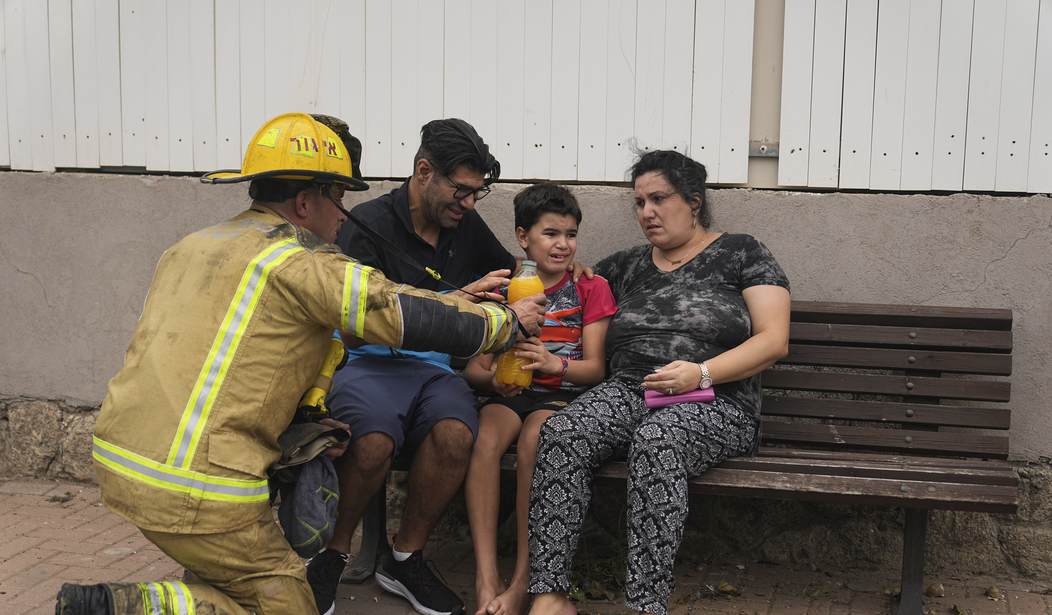Israel’s national anthem, “Hatikvah,” literally means “the hope.” It’s been sung by reservists on their way to fight to protect their fellow countrymen and women, their families, and their way of life. Citizens in Tel Aviv have taken to their balconies to belt out its lyrics in defiance of the rockets and terrorists who launch them. Israelis traveling home have stood and sang it aboard planes landing into a new war. The second stanza declares that “our hope is not yet lost, it is two thousand years old, to be a free people in our land — the land of Zion and Jerusalem.” The Hatikvah — written even before the State of Israel formally existed — has been a powerful declaration throughout the Jewish people’s history and it again became a defiant declaration of survival since Hamas barbarians invaded Israel from the Gaza Strip to rape, plunder, and kill innocent Israelis.
Just a few weeks ago, this writer had the privilege of visiting Israel. I stood at the edge of Israel’s border with Gaza, looking at the fence and observation towers used to keep terrorists contained. I walked through the Kerem Shalom border crossing at the intersection of Israel, Gaza, and Egypt — one of the ports where goods and people can legally pass between Hamas-run Gaza and Israel — looking at the weapons and other prohibited items seized by Israeli officials as terrorists sought to smuggle in weapons to launch attacks against innocent civilians in Israel. I descended 20-some meters into a Hezbollah terror tunnel discovered and closed off by the IDF on Israel’s northern border with Lebanon. I met with residents — including dozens of exuberant children — in Kibbutz Kfar Aza in southern Israel who pointed to playgrounds where Hamas rockets had previously landed and showed the terrorist projectiles made from street sign posts and sewer pipes sent as “aid” to Gaza along with incendiary balloons floated into Israeli kibbutzim by Hamas. I watched a stunning sunset from atop Mt. Bental in the Golan Heights after taking in the view of Syria near Kibbutz Merom Golan.
Everywhere I went in Israel, I was met with the unconditional hope, joy, and strength of her people. From the IDF soldiers manning Iron Dome batteries to the kids and pets of kibbutzim and business owners and groups working for peace and security, there was an undeniable embrace of the spirit and words of Hatikvah.
Since the first rocket alerts were issued late Friday night, these people and places were all I could think of. I feared the worst but hoped for the best as the all-too-common rockets turned into an all-out Hamas invasion of Israel. Still, "no news was good news" or whatever we tell ourselves to avoid assuming the worst.
Then the pictures started to circulate. And the videos.
Recommended
Now, the border fence with Gaza has holes driven through it and the observation towers are rubble. Kerem Shalom is shuttered after it turned into a warzone. Hezbollah has begun launching scores of rockets and mortars into northern Israel, opening a new front in the terrorists’ barbaric war on Israel. More than 200 residents of Kibbutz Kfar Aza were slaughtered by Hamas, including more than 40 babies and young children, some of whom were beheaded by the animals who raided their community after infiltrating Israel from Gaza. Projectiles now fly through the clear skies of the Golan Heights as attacks have been launched from Syria.
With these horrific scenes and more access to kibbutzim in southern Israel for reporters as the IDF cleared out Hamas terrorists came the unavoidable realization that something beyond the most horrible situation my mind could conjure had happened. Murder isn't a strong enough word for what Hamas terrorists did. Slaughter doesn't cover it. Butchering is still too mild.
But it all became confirmed and real. The death, the destruction, the horror, the evil. It all existed and still exists. It’s a devastating realization to admit that such evil exists in the world and the damage it can do to the good, innocent people of Israel. It’s easy to see what’s happened and lose hope, to want to crawl into a hole to avoid confronting the existence of this evil that caused a massive reality check for anyone who might have suppressed the idea that such barbarism was possible.
But the people of Israel haven’t and won’t lose hope. Even though this is not the first time evil has sought to crush their hope and end their very existence. Still, Hatikvah — its words written in the 1870s and put to music in the 1880s — remains a noble declaration, a rallying cry across centuries, that hope is not lost.
The Jewish people did not lose hope even when they were without a country to call home. They did not lose hope through the horrors of the pogroms and the Holocaust. They still haven’t lost hope amid their deadliest days since the atrocities of the Nazis, even as they see their families burned to death, their daughters raped and paraded through the streets of Gaza, their babies beheaded in their cribs. They continue to sing Hatikvah, just as generations before them have through dark, seemingly hopeless days.
Their hope, still, is not lost now — and it will win out again.























